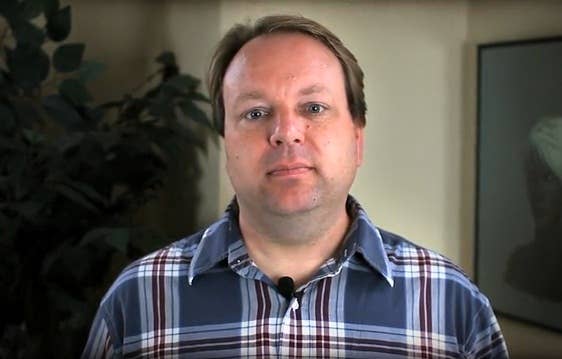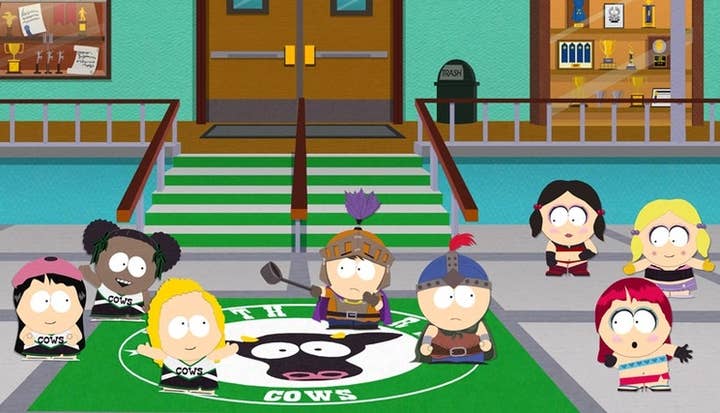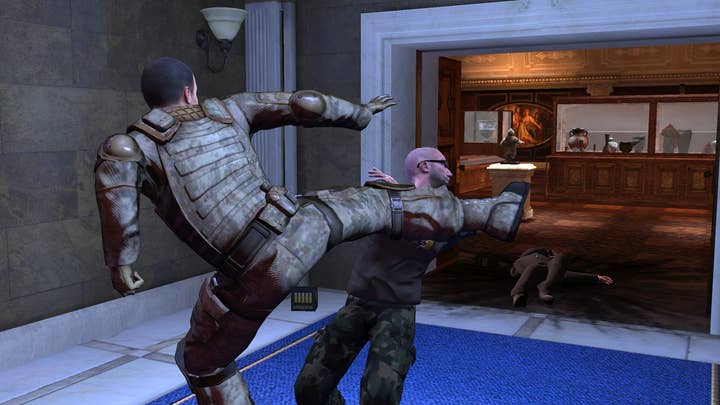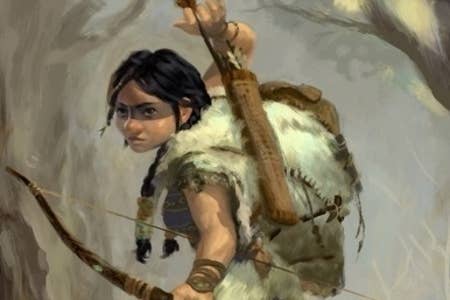Obsidian: Kickstarter the way to build a brand
Studio CEO Feargus Urquhart talks about Project Eternity and crowdfunding as key to owning the IP
Earlier this month, Obsidian Entertainment launched its Kickstarter campaign for Project Eternity, a throwback PC role-playing game in the tradition of Baldur's Gate and Planescape: Torment. Obsidian was seeking $1.1 million for development of the game, an initial request that topped notable Kickstarted projects like Double Fine Adventure, Wasteland 2, Republique, and even the Android-powered console Ouya.
Despite the lofty asking price relative to other Kickstarted games, Project Eternity was fully funded within 24 hours. As of Monday morning, with 22 days left to go for the campaign, Project Eternity had raised more than $1.9 million from more than 45,000 backers.
While the individual developers at Obsidian are well known for their prior work on original pre-Obsidian titles like Baldur's Gate, Icewind Dale, Fallout, and Planescape: Torment, the studio has established a reputation for working with existing intellectual properties, as it did with Star Wars: Knights of the Old Republic 2 and Fallout: New Vegas, and as it is currently doing with South Park: The Stick of Truth for THQ. To date, the company has only shipped one original IP, Sega's stealth-action game Alpha Protocol, making Project Eternity a rare opportunity for the studio to create from whole cloth.
Obsidian CEO Feargus Urquhart took time to speak with GamesIndustry International about the decision to turn to the fans for Project Eternity funding, the ways that impacts the development process, and how Kickstarter is changing the dynamic between developers and publishers.

A lot of it is what crowdfunding is all about. It's an opportunity to go to fans with something and ask for their opinions, their help, their money to make something you believe in. And we really believe in our role-playing games. We love making the big ones, but we believe in this old school, harder core RPG, and some of those things that are a little bit harder to get funded in the traditional publisher model. That's nothing against publishers. This is just a different model, and it's great to go back to something that is our roots.
We've talked with publishers a lot over the years and the last six months. We never went in with a Powerpoint and a proposal and pitched the full thing or anything like that. It's just different. It's not retail, but maybe we'll have a retail SKU after the game comes out. It's digital, but not a little digital game. It's weirdly in the middle. It falls into a no-mans-land a little bit about how products are being considered.
"We never went in with a Powerpoint and a proposal and pitched the full thing or anything like that. It's just different."
Feargus Urquhart
I'll be honest. We didn't really think about that. Maybe a part of it is we think a little too highly of ourselves… We go into things like this with the best intentions. We truly want to make this, so we didn't question whether someone would question if we were doing it for alternative reasons.
There are a couple different ways. We're going to be careful with the money because all game development hits snags. So a portion of the money will be set aside. Think of it as something like an escrow account. As development goes and goes, we'll spend more of that money because there's only so much development left where we could hit snags, so we don't need to reserve as much. And at the end, we've spent all the money and made a great game.
I think we have a lot of responsibility to keep people apprised. They've given us a lot of trust, and we take that very seriously. Our biggest responsibility is letting people know what's going on that's good, what are some challenges we're having and how we're dealing with them. I think it's like anything in life where you're kind of invested in something. It's when you get your periodic updates as to what's going on and you feel better that progress is being made. We understand it's a big responsibility and we can't just disappear off into the ether.

Well, when you're making an RPG, that makes stretch goals easy in some ways. RPG campaigns and games are all about adding more stuff, in a lot of ways. It's about more choices, and having another class to play is a great thing to have in an RPG. But there's a certain point at which there are just too many and they're not impactful anymore. So we're not going to continue to just add another race every X hundred thousand [dollars]. There's not going to be 17 races in the game; we're going to think of other cool things to add in that expand not only what the game is, but potentially what our high level backers are getting.
I think publishers are curious about the model and curious about what that can do. I think ultimately publishers are looking for good developers to make great games for them. They have their internal staff to make great games, and sometimes they need a particular type of developer to make a particular game for them. So I don't know if that changes things a whole lot on the bigger console level. On the smaller level, I think some publishers may really like the model. It's pretty scary when you're a publisher and you have to fund games because that's what you need to go ship. But now maybe some titles can come to you secondarily, or for distribution, or something like that where you don't have to worry about a cash outlay so much.
"[W]e're getting the opportunity to go build a brand, and it's a brand that we own."
Feargus Urquhart
I think so, but it depends on which part of the market you're talking about. For the $20-40 million, multi-SKU console game, that's not the Kickstarter world. I think what Kickstarter gives developers the capability to do-and this is how we're looking at it-is we're getting the opportunity to go build a brand, and it's a brand that we own. And that's what changes the power a little bit. Now I have a game that we're going to go make, and I have a brand. And I own that brand. And it's now something that if I go talk to a publisher to talk about doing something different with a brand-and this is years from now-they're not going to get to own that brand. That definitely changes whatever you call it, power or leverage… it changes the discussion. Absolutely.
I think ownership of your IP was easier to actually arrange 10 or 15 years ago. When the numbers weren't so high, when publishers weren't paying $25 or $30 million, the IP was more on the table as to whether you could own it or not. Over the last five or six years, it's gotten harder and harder. Bungie and Respawn and Insomniac, with such a track record, it's a value proposition for the publishers. "We want the next Call of Duty. Hey, these guys made Call of Duty. We're willing to give up some aspects of ownership because we're not in this segment of the market to the extent we want to be, but we'll trade what we would want normally to get into it." It's really become harder and harder for independent developers to own IP when you're talking to a publisher about $20- $30- $40 million.

I think the publisher understood, but I don't think it was aggressive, and I don't think it was even spiteful or something like that. Everybody has to walk in everybody's shoes, you know? Right now, publishers have a huge amount of pressure as it relates to the money going out and coming in. And there's a console transition, and console transitions are hugely scary. So a lot of them are looking at how they protect the cash they have and not have more cash outlays. That's just first and foremost in their mind so much right now that they're just looking at all the possibilities. And what comes out of that is that they might not think of what they're really asking of the developer. It's possible one of the publishers who approached us that way was thinking, "Could I get away with it?" But I don't know that at all. Most of the people I know at publishers aren't bad people by any stretch of the meaning. They're trying to do the job the best they can within the scope of what they have.
I'm not, actually. And that's entirely Feargus data. It's my own way of looking at the world. Baldur's Gate sold between 2-4 million units, and that was 10 years ago. It still sells today. The GOG guys put up packages of sales for the D&D games because they still sell. I think there's absolutely a market for them. I don't know what that market is. I couldn't tell you if it's 200,000 or 300,000 or 400,000, but there's definitely a market and it's hopefully more than the number of backers we'll have.
"I think ownership of your IP was easier to actually arrange 10 or 15 years ago."
Feargus Urquhart
How do I put it? It's like we all need to really do the numbers. Any publisher can ship N games every year. If a publisher normally ships 50 games or something, it's very hard to ship 100 games because they're not going to increase the number of people they have for a year just to ship 100 games or something. So publishers have to make sure they're shipping the right number of games at the right level. It takes a lot of effort to support a big console game; it takes much much less to support an XBLA game. And a game like this falls in some weird middle. Do we take it to retail? It's not just a download. But it's not a $500,000 budget XBLA game. It's niche… And it's hard for them to evaluate the upside and where to put it. And I think that's what's hard. It's not anything negative or bad; it's a question of what to do with it.
No they're not. It's a game that goes back to the roots of the great RPG games of the past and the focus of those was keyboard and mouse. Not that console games aren't great; they're just different. There's a big difference between Baldur's Gate: Dark Alliance [for consoles] and Baldur's Gate II [for PC]. And we don't want to create some camel in the middle to try to straddle a line. It's do one thing or another, and we're going to try to do the PC and do that right.









